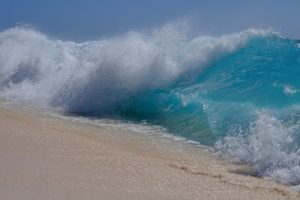 On the eve of World Oceans Day, the Pacific Community (SPC) has released a study confirming that wave energy could be a cost-effective energy resource for Pacific Island countries and territories.
On the eve of World Oceans Day, the Pacific Community (SPC) has released a study confirming that wave energy could be a cost-effective energy resource for Pacific Island countries and territories.
Entitled Cost analysis of wave energy in the Pacific, the study analysed wave energy resources in the Pacific and calculated the costs and potential power generation of a wave energy converter in a variety of locations, to determine whether wave energy could be a feasible alternative to fossil fuels.
It identifies most wave energy potential for Pacific Island countries and territories exposed to the southern ocean swells, such as French Polynesia, Tonga, Cook Islands and New Caledonia.
“The best candidates for this renewable energy technology are islands south of latitude 20ºS because they receive substantially more wave energy from southern ocean swells,” SPC Coastal Oceanographer, Dr Cyprien Bosserelle, who led the European Union-funded study.
According to Dr Bosserelle, ocean waves are often cited as an appealing source of renewable energy in the Pacific, yet the costs of purchasing, deploying, operating and maintaining the necessary technology – known as wave energy converters – were previously unknown.
The study finds that the cost of generating energy using waves is on par with other renewable energies, such as wind and solar, and that in some Pacific sites it could compete with the cost of diesel generators.
Dr Bosserelle is presenting the study at the 31st Science, Technology and Resources (STAR) Conference in Nadi, Fiji, hosted by the Government of Fiji (from 6-8 June) and supported by SPC through its Geoscience Division.
Renewable energy challenges and solutions for the region are also being highlighted today by SPC Deputy Director-General, Cameron Diver, at the Pacific Energy Conference in Auckland,
co-hosted by the New Zealand Government and the European Union.
“Filling knowledge gaps to enable innovation and investment in clean energy alternatives is vital if we are to meet our 2030 ambitions set out in the Sustainable Development Goals,” Mr Diver said.
“This latest SPC study suggests that wave energy is a genuine contender for the development of renewable energy in the Pacific, and provides important data to support decision-making.
“The deployment of wave energy converters in the Pacific could provide an opportunity for the technology to prove itself in the region and attract the attention of investors, policy-makers and decision-makers around the world,” Mr Diver said.
The research was made possible by the ACP Caribbean and Pacific Research Programme for Sustainable Development, funded by the European Union and implemented by the African, Caribbean and Pacific Group of States.
The Cost analysis of wave energy in the Pacific is available on the following website.
Media contact:
Molly Powers-Tora, Coordinator, Ocean and Tides Knowledge Unit, SPC, [email protected] or +679 8629655
Useful links:
Cost analysis of wave energy in the Pacific
STAR Network
Pacific Energy Conference 2016, Auckland
